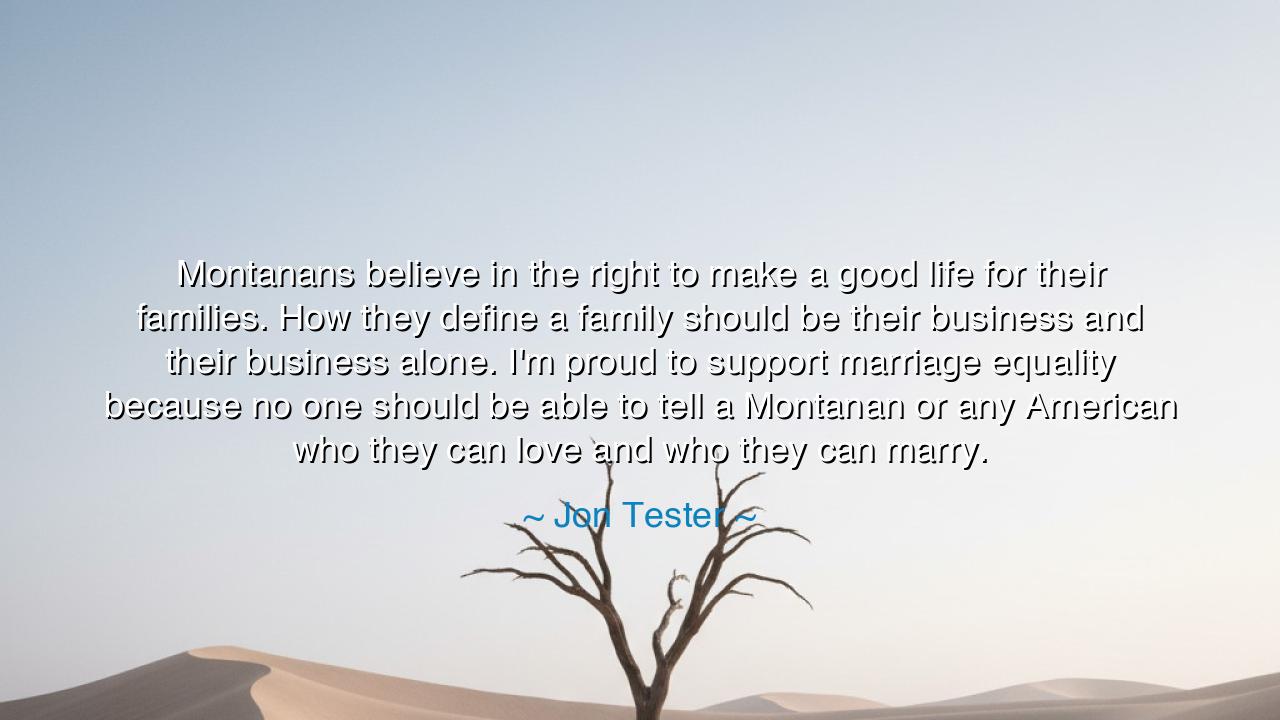
Montanans believe in the right to make a good life for their
Montanans believe in the right to make a good life for their families. How they define a family should be their business and their business alone. I'm proud to support marriage equality because no one should be able to tell a Montanan or any American who they can love and who they can marry.






When Jon Tester declared, “Montanans believe in the right to make a good life for their families. How they define a family should be their business and their business alone. I'm proud to support marriage equality because no one should be able to tell a Montanan or any American who they can love and who they can marry,” he spoke not only as a lawmaker but as a voice of a rugged people, heirs to the great plains and the high mountains. His words carry the strength of a land where independence is sacred, where neighbors respect one another not because they are the same, but because they share the bond of freedom. In his declaration, he ties the ancient thread of liberty to the modern struggle for marriage equality, and he does so with the clarity of one who knows that love, like the land, belongs to no master but itself.
The meaning of this quote is simple yet profound: freedom is hollow if it does not extend to the deepest bonds of the human heart. In Montana, where settlers carved life from harsh soil, where families endured storms, famine, and isolation, the family has always been the root of survival. But Tester reminds us that family is not a single mold handed down by tradition—it is the living union of souls who choose to stand together. To deny any man or woman the right to define their family is to deny them the very foundation of life.
The origin of Tester’s words lies in the great debates of the early twenty-first century, when the question of marriage equality ignited the conscience of a nation. For generations, gay and lesbian Americans had been told that their love was unworthy of recognition, their families invisible in the eyes of the law. In Montana, a land known for both fierce independence and deep-rooted conservatism, the call for equality rang with special power. Tester’s voice rose in that hour, not to command others’ lives, but to defend their right to command their own.
Consider the story of Jim Obergefell, who fought a long and bitter legal battle to have his marriage to his late husband, John Arthur, recognized by the state of Ohio. Though their marriage had been solemnized in another state, their home would not acknowledge it, leaving Jim as a legal stranger to the man he loved. His case, Obergefell v. Hodges, reached the Supreme Court, and in 2015, the Court declared same-sex marriage a constitutional right. Jim’s fight, like Tester’s words, embodies this truth: that no one should be able to tell another who they can love and who they can marry. His story is not only about one couple, but about millions whose dignity was finally affirmed.
Tester’s words also reveal a deeper wisdom: that when a government intrudes upon love, it wages war against its own people. Just as the ancient kings who sought to control marriages and bloodlines brought unrest upon their kingdoms, so too do modern powers sow division when they deny the freedom of love. True stability comes not from control, but from trust—from granting every citizen the right to chart their own course of the heart. This is why Tester's voice carries weight: he frames marriage equality not as a partisan cause, but as the natural extension of liberty itself.
The lesson is clear: freedom without love is a barren field. If we cherish liberty, we must defend the right of every person to love openly and to build a family in peace. The test of a just society is not how it treats the powerful, but how it honors the intimate lives of the humble. We cannot claim to value family and yet dictate whose families are real and whose are not. To do so is to fracture the very principle upon which communities are built.
What, then, should the listener do? First, honor all families, in whatever form they take, without judgment or scorn. Second, defend marriage equality wherever it is threatened, remembering that the fight for dignity is never truly finished. Third, live with the humility that your way is not the only way, that freedom demands room for many paths, many loves, many homes.
So let these words stand as both reminder and command: “No one should be able to tell a Montanan or any American who they can love and who they can marry.” Let love be free, let families be honored, and let the land of liberty remain true to its name. For when freedom and love walk hand in hand, a people will never be broken.






AAdministratorAdministrator
Welcome, honored guests. Please leave a comment, we will respond soon